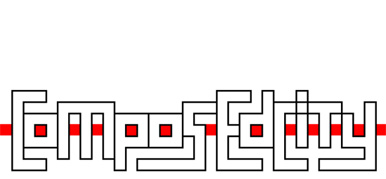|
intro / topic / projects / publications / organisation Workshop Berlin: sound works Fly Paper / Grill Cantor / Kikkit / Metal Containers / Playback / Riffelschiene / Silent Neighbours / Tongue Squash
From 4 till 8 June 2008, a workshop was organized for architecture students from the TU Berlin and sound studies students from the Universität der Künste on the topic of sound (art) in public space. The unique mixed group developed ideas on how sound design and physical design of public space can be combined, and how public space can be played as a musical instrument. These ideas were projected on a specific location, the Wriezener Freiraum in Friedrichshain. The realized sound works were presented at festival Tuned City and the Langen Tags der Stadtnatur on the 4th and 5th of July. The location, the Wriezener Freiraum, part of a former train station and now being developed into a park, can be seen as a typical non-place: a space that is defined by its borders, physically and aurally. The location was tested and mapped for its acoustic character and potential (sonotopes) from a sound as well as urban and landscape perspective. The sports potential that was present, was linked to playful social acoustic interaction. Spatial en sonic morphing of local elements created unexpected result.
The sound works give attention to the different activities in the park, inviting to play, and make activities audible. The kinetic energy of people is used in an interactive way to set up the basis for new sonotopes. A series of giant wooden tongue drum boxes is hung on the empty walls of an unused building. The tongue drums invite the sportsmen to play them; they add a tonal layer to the composition of the squash game and become part of this game. At the other side of the park strip, brightly coloured cone-shaped plastic buckets cover the outer sides of the 6-meter high fence of a sports court. During a game of basketball or football, the cones will amplify the sound of the impact of a ball against the steel fence. Also a special type of stone grills is developed for this place. When the coals burn, hot air is lead through a revolver-construction of low whistles; this allows the griller to choose the tone. These sounds blend into new sonotopes, together with the background sounds. In some works the relation between these two is explored: the physical borders of the Wriezener Freiraum are opened aurally. Not only distance but also the natural rhythms make the sonotopes dynamic, and changing each two hours, each day, each week, each shower. An example can be found in the manipulation of the adjacent railway with small kerfs and, by which the acoustic potential of the train and the rail network is being used to create new tonal rhythms. Paper boxes catch buzzing Berlin flies, that are released with the next rainfall. Teachers: Peter Veenstra, Geert-Jan Hobijn, Erik Hobijn Visiting critic: Joachim Schultz Participants: Alicia Argüelles Garcia, Anke Eckardt, Annie Goh,
Christian Schultz, Christoph Schwander, Emad Parandian, Florian
Guschke, Gilles Aubry, Hannah Logan, Johannes Steininger, Marc
Gabriel, Marie Luise Wunder, Martin Backes, Max Kullmann, Nicolas
Aracena, Robert Schwarz, Thomas Wochnik,
for more information info@composedcity.org 01/11/2008 |

